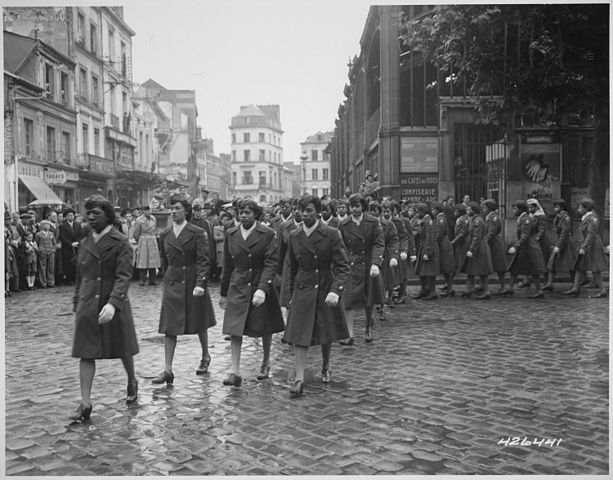The Women of the 6888th Move the Mail
In 1945, the U.S. Military was seriously behind in delivering the mail to Americans stationed in the European theater. There was a two-year backlog of letters and packages addressed to some seven million soldiers and aid workers. The thankless job of sorting through a warehouse full of undelivered mail was assigned to the 855 African-American women of the 6888th Central Postal Directory Battalion, also known as the “Six Triple Eight,” under the command of Major Charity Adams.
Part of the Women’s Army Corps (WAC), the women of the 688th took the motto “No mail, low morale.” They arrived in Birmingham, England in February 1945, and set to work in unheated and poorly lit warehouses that were stuffed to the ceiling with undelivered packages and letters. (Including undelivered goodies that made the local rodent population very happy.) For three months, they worked three eight hour shifts each day, seven days a week, sending out 65,000 letters each shift.
The sheer volume of undelivered mail was a challenge. But it wasn’t the only challenge. Some of the mail was, shall we say, optimistically addressed: ”Junior. US Army” Even properly addressed mail was difficult to deliver. There were, for instance, 7,500 Robert Smiths stationed in the European theater and frontline soldiers were constantly on the move. In order to make their job easier, they created a system of information cards with serial numbers, one for each soldier—similar to a library card catalog back in the days when catalogs used actual cards.
T he 6888th was the only all African-American female unit sent overseas during World War II. Despite the fact that they were making a valuable contribution to the war effort, the battalion suffered the same racial discrimination in the Army as they did in civilian life. They slept in segregated barracks and ate in segregated mess halls. As Major Early recalled, “ We didn’t mix it up. We were segregated in two ways, because we were black and because we were women.” Although white WACS and African-American soldiers were welcomed to a local club for American enlisted personnel run by the American Red Cross, the women of the Six Triple Eight were not allowed to use its facilities. When the Red Cross offered them alternative segregated facilities, Major Early and her women boycotted them and ran their own. Some members of the battalion felt they were treated better by the local people than by their fellow American soldiers.
Once the backlog in Birmingham was cleared, Six Triple Eight was transferred first to Rouen, and later to Paris, to deal with more stashes of undelivered mail.
In February, 1946, with the war over, they returned to the United States and the unit was disbanded. But for twelve months, neither snow, nor sleet, nor broken windows, nor badly addressed envelopes kept them from moving the mail on its appointed rounds.





